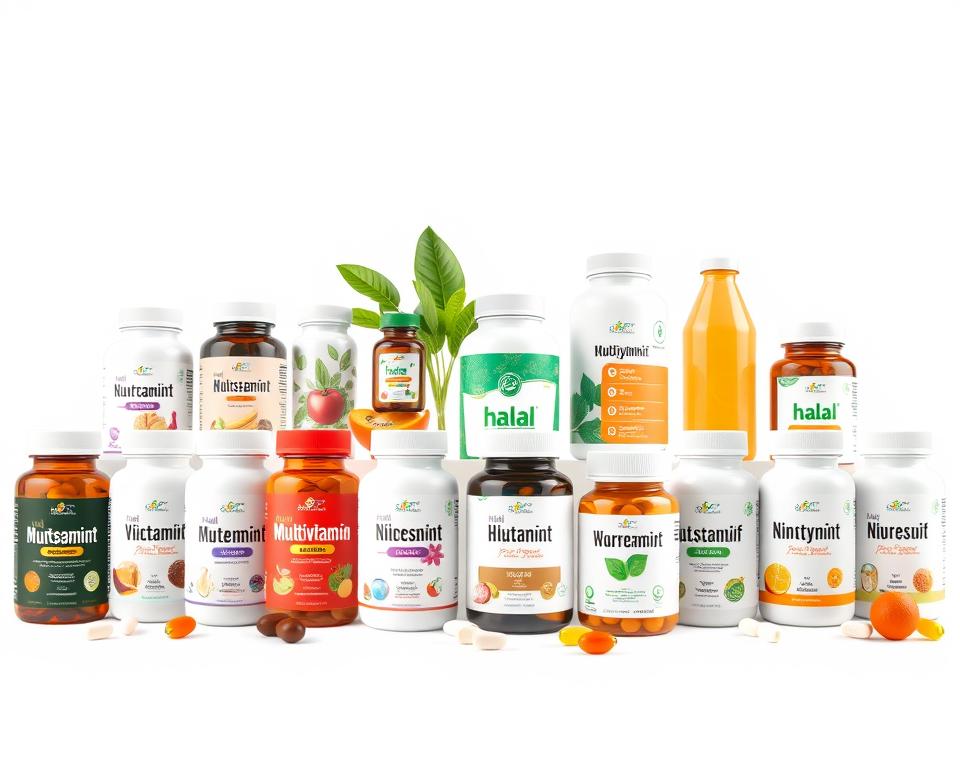Understanding Halal Multivitamin Supplements: Key Facts
Have you ever wondered whether the vitamins you take align with your beliefs and dietary needs? Interest in halal multivitamin options is on the rise, fueled by people aiming to respect Islamic dietary standards and support their well-being. This trend highlights a broader interest in halal nutrition, which combines wellness with respect for personal beliefs. We will dive into the importance of halal health and why these halal multivitamin stand out as top choices.
Exploring Halal Dietary Supplements
These dietary supplements are created to meet Islamic dietary requirements. These products are subjected to thorough checks to guarantee the absence of ingredients like pork, alcohol, or non-halal animal sources. The surge in health consciousness has elevated interest in halal nutritional products. Today’s shoppers want detailed insights into manufacturing processes and product sourcing.
Wellness supplements certified as halal distinguish themselves through ethical manufacturing practices. Producers are obliged to ensure their offerings are devoid of any prohibited elements. Concentrating on ingredient purity elevates nutritional benefits and solidifies trust in halal-approved products.

Benefits of Halal Multivitamin Supplements
Selecting premium halal multivitamins provides key advantages for individuals seeking health improvement within their religious framework. In addition to observing dietary laws, these supplements promote comprehensive health. They supply essential vitamins and minerals to increase energy levels and fortify immunity.
Expansion of the Muslim community has driven up the desire for products honoring spiritual and cultural principles. Halal vitamins appeal not only to devout consumers, but also to those interested in ethically and transparently made products. Their exclusion of any forbidden substances makes them attractive to vegans, vegetarians, and health-conscious buyers.
Opting for halal-certified options means trusting in their truthful and open manufacturing practices. As a result, consumers feel reassured and recognize the healthy decision they’re making. Integrating halal multivitamins into your regimen boosts energy and provides reassurance.
Essential Components of Halal Multivitamins
Halal multivitamin supplements aim to provide essential nutrients from safe, compliant sources. They feature compounds that support holistic health while respecting dietary regulations. Notable ingredients include:
- Lichen-derived vitamins acts as a vegan D source aligned with halal nutrition.
- Beetroot-sourced iron, serves as a wholesome, halal-approved iron source.
- Algae oil–based omega-3, delivering an algal omega-3 supplement suitable for halal diets.
Buyers should confirm that components like gelatin and whey originate from animals processed under halal rules. This check guarantees the animal-based ingredients follow halal slaughter and processing protocols. Selecting these supplements upholds dietary convictions and encourages overall well-being.
Common Haram Ingredients to Avoid
Exploring halal dietary supplements requires a keen eye for haram ingredients. These substances can undermine the integrity of halal nutrition. It’s essential to ensure that the supplements we choose adhere to dietary laws and our personal beliefs.
Pork-based gelatin is frequently used in capsules, making it haram. Additionally, alcohol as a solvent and enzymes derived from non-permissible animals pose concerns. Even mineral stearate and glycerin could breach halal rules if derived from forbidden items. Going with plant-sourced supplements ensures avoidance of such haram elements.
Recognizing prohibited ingredients is essential for anyone committed to halal nutrition. With this awareness, consumers can choose truly halal supplements that support health without contravening faith.
How to Identify Certified Halal Vitamins
When searching for certified halal vitamins, it’s important to examine the packaging closely. Check for the halal mark, proving the supplement meets strict halal requirements. That certification logo serves as a trusted sign of halal integrity.
Also, make a point to inspect every ingredient stated on the package. Ensure every animal-sourced element is approved by halal certification bodies. Pay special attention to gelatin, as it could be non-halal if improperly sourced. Ensuring every ingredient’s halal compliance is essential for a prudent decision.
Asking manufacturers for specifics helps understand their halal verification process. Manufacturers can detail how their products undergo halal vetting and auditing. This can boost your confidence in the product you choose. Adhering to this process guarantees your halal vitamin choices align with your dietary beliefs.
Gummy Vitamins and Halal Compliance
Gummy vitamins have become a hit among both kids and adults, making nutrition fun and tasty. Yet traditional gummy confections typically rely on porcine gelatin, disqualifying them as halal.
Multiple companies have introduced halal gummies, replacing gelatin with pectin or carrageenan. Such plant-based binders allow consumers to indulge in gummies while staying true to their dietary laws. It’s key to check the ingredient list and look for halal certifications when picking halal vitamins for Muslims.
Selecting appropriate halal supplements supports health without compromising dietary principles.
| Brand | Type | Halal Compliance | Key Ingredients |
|---|---|---|---|
| SmartyPants | Gummy Multivitamins | Halal Certified | Pectin, Vitamin D, Omega-3 |
| NutraBlast | Gummy Immune Support | Halal Certified | Carrageenan, Vitamin C, Zinc |
| MaryRuth Organics | Gummy Probiotics | Halal Certified | Pectin, Probiotic Blend |
Protein Powder Halal Options for the Active Individual
If you’re committed to fitness, incorporating halal protein powder can be highly beneficial. Typically sourced from whey or vegan proteins, these powders support muscle regeneration and growth. Be vigilant about scanning ingredient lists to avoid any impurities that breach halal guidelines.
To meet consumer expectations, many suppliers highlight halal credentials and supply chain transparency. This shift caters to health-conscious individuals, ensuring their protein intake aligns with halal dietary standards. Going for halal-certified protein supports faith-based eating standards and enhances well-being.
| Brand | Type of Protein | Certification |
|---|---|---|
| Optimum Nutrition | Whey Protein Isolate | Halal Certified |
| Orgain | Plant-Based Protein | Halal Certified |
| Muscle Milk | Protein Powder Blend | Halal Certified |
Integrating halal protein powder into your nutrition plan can advance your workout results and honor halal values.
Halal Multivitamin Supplements for Boosting Immunity
In periods of heightened health concerns, halal supplements can bolster immunity. They are packed with vitamins A, C, D, and Zinc. The inclusion of these elements strengthens immunity within halal compliance. A diverse selection of top halal-certified products is available to meet immune support demands.
There’s a growing number of halal-certified options available. Such supplements aim for enhanced well-being while adhering to halal health criteria. They provide essential nutrients to boost the immune system. Adding these supplements to your habit encourages top health and maintains spiritual integrity.
The Bottom Line
The role of halal multivitamins in health and wellness is rapidly growing. These products attract consumers who combine nutritional needs with faith-based dietary rules. Growth in halal offerings enables health-seeking consumers to remain faithful to their values. Such developments lay the groundwork for comprehensive wellness rooted in halal compliance.
Understanding certification processes and checking labels is essential. It helps individuals make informed choices about their halal dietary supplements. Following these steps reinforces health and maintains dedication to beliefs.
The market for halal supplements is expanding, providing a chance to integrate ethics into health routines. Purchasing halal multivitamins cultivates a wellness plan aligned with ethical standards. This respects both religious beliefs and lifestyle preferences.

